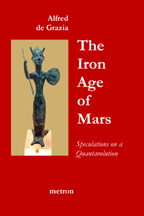The Quantavolution Series of Books
Have A Look At The
|
|---|
 |
Alfred de Grazia's New Book
: THE IRON AGE OF MARS |
I am here to pay homage to an old friend already 22 years dead, Immanuel
Velikovsky. His books of fifty years ago, however, are very much alive.
I also see this conference as an occasion to pay my respects to Professor
Emilio Spedicato, who has given a unique impetus to the quantavolution movement
at the University of Bergamo and around the world.
And third, I am privileged here to tell something about my own work.
I knew Velikovsky for two years, until his death. I almost accompanied my
husband, Alfred, to what was going to be the last meeting ever he would have
with Velikovsky, that was on Wednesday, November 14, Velikovsky would die on the
17, a Sabbath. It was a beautiful fall afternoon in Princeton, characteristic of
the climate of the Northeast of the United States. Somewhere near the top of
Harrison Street, I let Alfred go on alone, after he had asked if I wanted to
come with him. He had important things to talk with him about - two days
earlier, on Monday, we had visited Velikovsky together and Alfred had offered to
write an article that he would draft which would then be revised by Velikovsky
and sent out in finished form.
Alfred was trying something no one had done before, co-sign an article with
Velikovsky.
The Aprupt Origin of Language |
|---|
| The theory of language origins has followed the theory of evolution according to the Darwinian mode. That is, like the human species and its culture, language is asserted to have come about gradually, bit by bit, as the human anatomy and human behavior have changed. It is not difficult to assign the many factors that constitute a fully communicating being among ten, a hundred, a thousand incidental changes, all summing up to the vocally, digitally, gesturally fluent person of today. Thereupon, an eternity of discussion will occur -- it has begun -- over the priority and ordering of these many elements as they may have entered as increments of the evolutionary process. |
| I have cut short such an interminable discussion, at least theoretically, by carrying over my particular theory of change, which is called quantavolution, into the theory of language. The few minutes that are allowed to me here do not bode well for an introduction to a general theory, but I have the advantage of having published two books directly upon the subject of human development and human nature, and several other books as auxiliary support. I must, and therefore I may, be brusque in presenting the case for the quantavolutionary and hologenetic theory of language, and trust to your tolerance to allow this. |
| Without asserting any number dogmatically, I may sketch the theory in eighteen theses concerning the origins of language, beginning with the momentous cosmic events that led to humanization and human communication. |
| *Delivered before the Language Origins Society Congress, Oxford University, 30 August 1986. |